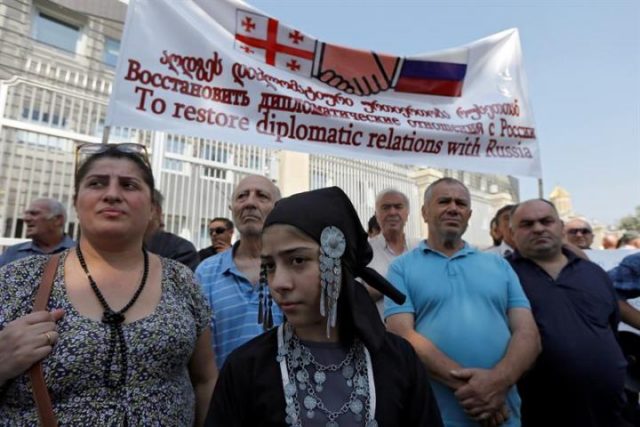
Georgian Special Services Publicize Russia’s Attempts to Subvert Country From Within
Publication: Eurasia Daily Monitor Volume: 15 Issue: 55
By:

The Georgian parliament plans to hold hearings, on April 18, regarding the State Security Service of Georgia’s (SSSG) recently published report detailing the risks and challenges to the country’s security. The report covers issues related to the occupied territories of Abkhazia and South Ossetia, terrorism, and counter-intelligence activities, among other topics (Civil Georgia, April 5).
The SSSG is legally obligated to provide the parliament with an annual report on threats and risks to the country’s security. Previous such documents did not arouse much public interest or excitement since they mostly limited the discussion to threats coming from the occupied territories. But the announcement of the current report—fragments of which were reprinted in the press—became a local sensation. For the first time, the State Security Service openly warned authorities and society that a “foreign state” is trying to influence Georgian politics from within, and not solely from the occupied territories—as in the case of the murder of Georgian citizen Archil Tatunashvili, in custody, in South Ossetia (see EDM, March 29). According to the SSG’s report, the “foreign state” is attempting to create its own agent network inside Georgia, whose purpose is to try to influence the decisions of the parliament, the government and other state institutions.
For diplomatic reasons, the report does not specify which “foreign state” it is referring to. The SSSG avoids such specifics, so as not to politicize the issue. But undoubtedly, the euphemistic phrase stands in for the Russian Federation (Parliament.ge, accessed April 11).
“The main goals of the activities of the special services of the foreign state are to provoke anti-Western attitudes and nihilism in Georgian society; damage Georgia’s international image; provoke polarization, destabilization, and conflicts on ethnic and religious grounds; [and contribute to] the country’s disintegration,” the report stresses (Parliament.ge, accessed April 11).
According to the SSSG report, the foreign special services “are trying to disguise their activities as commercial, diplomatic, religious and humanitarian projects.” Under this cover, they try to penetrate Georgian state institutions, obtain secret information, expand the agent network, as well as influence the processes in the political, economic and military spheres. The foreign state and its special services “use the technology of hybrid war”: they organize propaganda media campaigns and information diversions, launch cyber-attacks, as well as activate destructive political groups and populist associations to carry out destabilizing activities.
The SSSG warns that Russia is trying to expand its local infrastructure of political influence, lobby groups, pro-Russian political associations and foundations. Moreover, it uses bilateral trade and energy to manipulate Tbilisi. Russian agents often try to obtain a “residence permit” in Georgia. To this end, they marry Georgian citizens or make small investments in order to legally gain residency. Furthermore, “The foreign special service is trying to create expert research centers and agencies to develop specific topics with which to disorient the public,” the report says.
The SSSG has identified several individuals allegedly engaged in anti-state activities on the instructions of foreign special services. But their names are not listed in the report. However, 11 criminal cases have been initiated in connection with the espionage activity, and 5 people have been arrested (Parliament.ge, accessed April 11). Particular attention is being paid to individuals working at local organizations or agencies cooperating with the United States and the North Atlantic Treaty Organization (NATO): the report notes that the “Foreign Intelligence Service” is trying to obtain secret information by exploiting Georgia’s active cooperation with Western states.
The SSSG report was positively received by lawmakers from the ruling party Georgian Dream as well as the opposition. Undoubtedly, the parliament will officially approve this document in future hearings.
Georgian military expert Vakhtang Maisaia told this author that the appearance of such a radical report by the State Security Service (compared to more muted documents produced in past years) is related to recent global events in the world, including the growing tensions between Russia and the West following the “chemical attack” in England (see EDM, March 12, 15). “We are living in the era of a new cold war. Georgia is at the epicenter of this war. Russia considers us weak and tries to use all its levers of influence against us. Therefore, the activation of the secret services is not surprising,” Maisaia said (Author’s interview, April 6).
Irakli Batiashvili, the former head of the Georgian special services, noted that Georgia is “under attack” by Russia and its technologies of a “hybrid war.” But he stressed Georgia can win this war despite Russia’s huge resources: “We cannot defeat Russia in an open war, because the Russian army is stronger than the Georgian one. But the ‘hybrid war,’ including the war of the special services, develops according to different rules, whereby [the most important assets are] the professionalism of the special services employees, their patriotism and fidelity to the ideals of independence, and, secondly, the help of our friends, including the US intelligence agencies and those of other NATO members.” He recalled, that this particular combination of factors helped Georgia in the past to deter looming attacks “from the north.” “We will hope that this will be repeated in the future,” Batiashvili said (Author’s interview, April 7).
Hearings in parliament on the recent report produced by the State Security Service are not aimed at making any amendments to Georgian legislation. The current laws, if used professionally, are sufficient to repel any “attacks” on the “hybrid war” front. Importantly, the SSSG report and its swift approval by the national legislature sends a signal that the Georgian elites, the establishment, the political class and the broader society are ready to resist the unconventional and subversive tactics being employed by Georgia’s increasingly aggressive neighbor.



